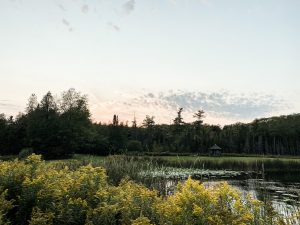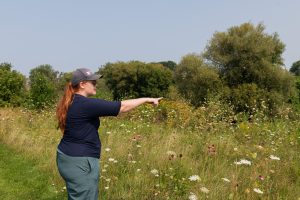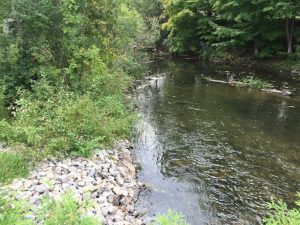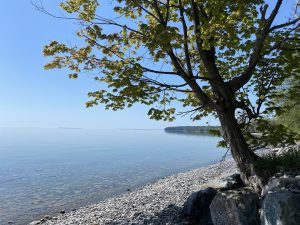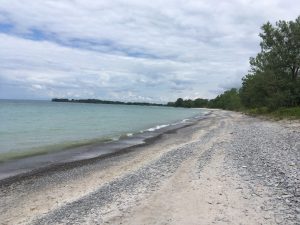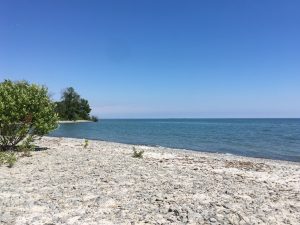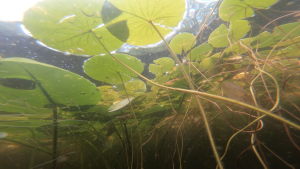by Jonathan Miller, Riparian Habitat Restoration Intern World Wetlands Day (February 2nd) is once again upon us! Wetlands, which include marshes, swamps, fens, bogs, and even lakes, provide a wide variety of essential ecosystem services and functions critical to the planet's well-being. Wetlands most notably improve water quality by filtering excess nutrients or toxins from agriculture, roads, and sewage runoff. Equally remarkable, wetlands act as carbon sinks, storing carbon captured from ... Read More
Watersheds Canada to partner with Crowe Valley Conservation Authority to restore Ontario shorelines in 2024-2026
Watersheds Canada is bringing its flagship shoreline restoration and re-naturalize program, The Natural Edge, to the Crowe Valley Watershed in Ontario in 2024-2026. This program expansion is possible thanks to a new partnership with the Crowe Valley Conservation Authority and local community lake associations, and funding by Canada Water Agency through the Government of Canada’s EcoAction Community Funding Program. Vegetated shorelines of at least 20-30 meters wide are shown to remove up to ... Read More
Salt Pollution Stress Alters Freshwater Food Webs
by Alana Coulombe, Education programs administrator Nature sustains itself through food web interactions that support long-term ecological balance. Every organism is part of multiple food chains that overlap and connect to form larger food webs within a single ecosystem. Each web is woven with lines that trace the potential flow of nutrients and energy from one organism to another within an ecosystem. Environmental sustainability depends on these balanced interactions between organisms in a ... Read More
10 Days of Nature Based Winter Activities
by Paige Jessup, Climate Resilience Intern Christmas does not have to be the only thing you look forward to this winter! There are lots of ways you can enjoy the outdoors and spend time with your family. Here is a list of 10 things you can do this winter to get you started on connecting with nature, supporting your local ecosystems, and having fun with loved ones! 1. Snow Painting Make the world your canvas! On the day of a beautiful, fresh snowfall, take a spray bottle and fill it with ... Read More
Why ‘Soft’ Shorelines Are More Beneficial to your Shoreline Property
by Alana Coloumbe, Education programs administrator Shorelines are the interface between land and bodies of water that are important for both humans and wildlife. Shorelines facilitate the exchange of resources between aquatic and terrestrial ecosystems, and therefore affect the functioning and ecological condition of both ecosystems (Wensink & Tiegs, 2016). Recent human developments for industrial, commercial, recreational, and residential purposes have threatened shoreline stability ... Read More
The Dynamic Coastlines of the Laurentian Great Lakes – Part 3
by Ty Fischer, Riparian Health Restoration Intern This is part 3 of a series on the Great Lakes. To read the first part, please click here; part two is found here. Erosion is a common problem on coastal bluffs and beaches on the Great Lakes’ coastlines. Despite the ubiquity of hardened shoreline structures in the region to manage these issues, such options are often not ideal since they are prone to failure and can disturb important natural processes and native species. Other large-scale ... Read More
The Dynamic Coastlines of the Laurentian Great Lakes – Part 2
by Ty Fischer, Riparian Health Restoration Intern This is part 2 of a series on the Great Lakes. To read the first part, click here. With water level fluctuations operating on daily, seasonal, and annual cycles, and with frequent disturbances from high winds, large waves, seiches, and storms, the Laurentian Great Lakes are truly dynamic freshwater systems. As a result, they display a diverse range of coastline types ranging from steep coastal bluffs to vast sandy beaches that are highly ... Read More
The Dynamic Coastlines of the Laurentian Great Lakes – Part 1
by Ty Fischer, Riparian Health Restoration Intern Reaching up to hundreds of kilometers wide and hundreds of meters deep, it is perhaps not surprising that the Laurentian Great Lakes share many geological similarities with saltwater oceans. They have high winds, large waves, and even complex current systems that in many ways make them dynamically closer to being inland seas than typical freshwater lakes (Rao, Schwab, 2007). As a result of these strong hydrological processes, their coastlines ... Read More
Congratulations to Watersheds Canada’s Grand Prize winner, Dianna!
Congratulations to Watersheds Canada's Grand Prize winner, Dianna S. of Wellington! Thank you to everyone who supported our charity lottery in 2024. The 5050 pot grew to $4462 -- the biggest prize ever awarded by our organization. The draw took place on the morning of November 2, 2024. "The only prize I ever won before was a gingerbread house," said Dianna, noting that her tickets are always purchased in the spirit of good causes, never giving much thought to the chance of winning. "It's easy ... Read More
The Benefits of Aquatic Vegetation for Wildlife and Freshwater Health
by Ty Fischer, Riparian Health Restoration Intern Aquatic plants in our lakes and rivers are often referred to as ‘weeds’, and the use of this term shows how they are generally perceived by waterfront property owners – as a nuisance. This is because the vegetation can get tangled in boat motors, tickle the toes of swimming passerby, complicate fishing endeavours, and is just generally seen as an unattractive part of the waterway. The irony is that every single amenity offered by our lakes ... Read More
- « Previous Page
- 1
- …
- 4
- 5
- 6
- 7
- 8
- …
- 21
- Next Page »

